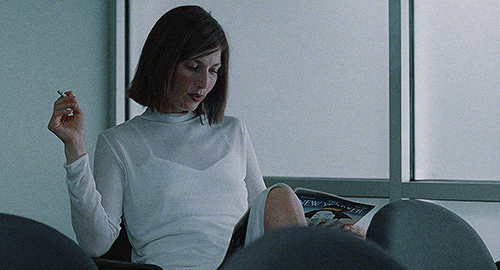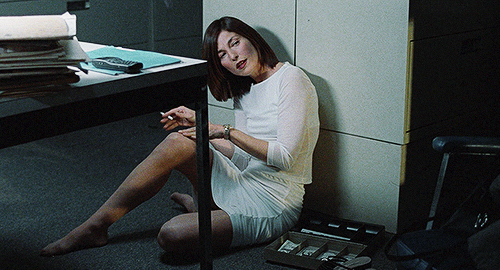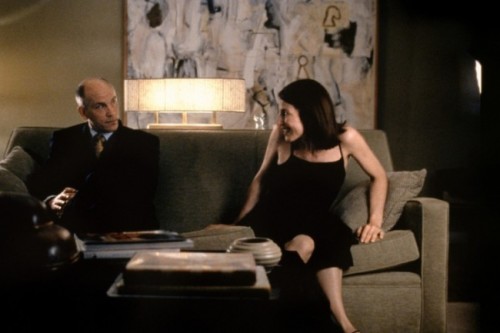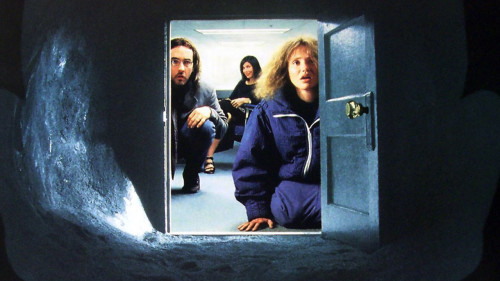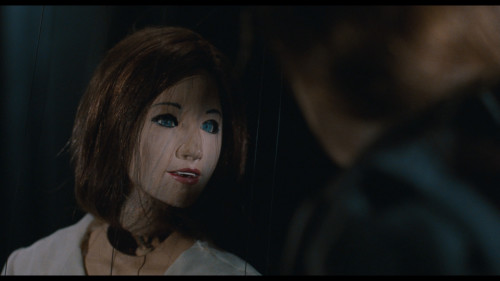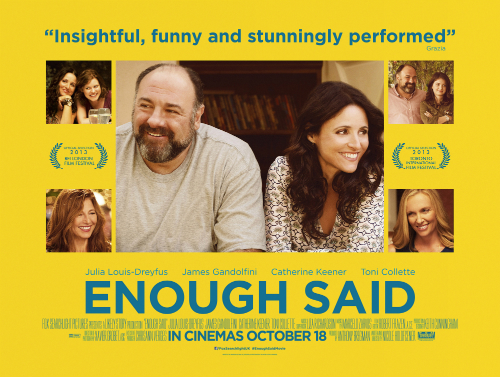This guest post by Sara Century appears as part of our theme week on Unlikable Women.
Being John Malkovich is a delightful trip of a movie from beginning to end. It’s a classic, and, if you haven’t seen it, you really should, definitely before you read this article.
It is based on a puppeteer named Craig Schwartz, who has taken on a job to support his puppeting habit (stick with me here). He meets Maxine, who he develops an unhealthy obsession with despite the fact that he’s married to Cameron Diaz, aka Lottie. He discovers a portal that leads to John Malkovich’s brain that Maxine brilliantly decides to rent out to people… because she is a genius. Maxine seduces Lottie while Lottie’s in John Malkovich’s body, and then slaps Craig in the face when he tries to kiss her. It is amazing. The movie gets even more complicated from there. Charlie Sheen shows up out of nowhere. It’s epic, so just go watch it, or agree to be confused, because I’m here to mostly talk about why Maxine is a great character, despite the fact that she could be considered by some misguided souls as somehow “unlikable.”
Maxine is played by Catherine Keener, who is probably one of the better actors in all of Hollywood right now. When she shows up, she is immediately the most interesting character in the movie. Maxine radiates self-confidence and style, and, in comparison, Craig becomes absolutely cartoonish, if he wasn’t already. There is almost no reason to watch the movie without Maxine. She propels everything forward in a magnificently hands-off fashion, letting the obsessions of others carry her on a wave of success that could have lasted forever. If she hadn’t fallen in love. With… Cameron Diaz. Maxine is a perfect character. She stands up for herself, takes no guff off of anyone, and goes for what she wants while issuing remarkable and hilarious ultimatums to those around her. I don’t just like Maxine. I don’t just love Maxine. I am Maxine.
Yet, not a year goes by, not a year, when I do not hear from some Cusack-loving member of the patriarchy (otherwise known as my friends and family) accusing Maxine of being “a bitch,” “a gold-digger,” and some… worse words than that. Use your imagination. I’m not going to, because it horrifies me to hear people speak badly of something that they clearly don’t begin to understand. Why try to put Maxine in a box? She doesn’t fit within your narrowly defined limitations, my friend. Maxine is one of the greatest characters in film, and I’m going to let you know why in a pointedly numbered list that descends in order of importance.
7. Best dressed person in the movie, and possibly in any movie, ever. Who did wardrobe for Maxine? Did you win an Oscar? Because you should have won an Oscar. Maxine actually has pretty much only two wardrobe items: white dress, and black dress. MAGNIFICENT. Brilliant social commentary on the rigid black and white world that tries to limit her from achieving her deserved position in society. Don’t care if that’s how you meant it, that’s how I’m taking it, and BRAVO.
6. Best lines in this movie, and possibly in any movie, ever. The first line Maxine has is just her calling out bullshit like a pro. She does that through the whole film, and it is great.
5. Craig Schwartz is like the stereotypical “nice guy,” who thinks he’s in love with a girl that doesn’t notice he exists, and then freaks out on her for being “evil” when she really just doesn’t want to sleep with him. He’s the worst, and he really just a whole lot of problems for everyone, ultimately leading himself down a path of ruin. Maxine as his breezy, unaffected foil is a perfect antagonist-turned-protagonist, so, even if she were evil, she’d still be a pretty great character.
4. Maxine has a totally radical view of sex and relationships, and she isn’t afraid to go for what she wants and dare to have it all. She is a pioneer of not only women’s rights but also defining relationships in unconventional terms.
3. OK, so maybe once or twice Maxine behaves slightly amorally in this movie. Here’s the thing, she’s a single woman trying to make it in a harsh world where you gotta be tough as nails to survive, and if you don’t, it’s just too darn bad. You’re supposed to sympathize with her. She makes bad choices, we all make bad choices. Does that mean we deserve to be hounded forever over that one time we left our girlfriend in a cage with a monkey and slept with her husband after he literally stole John Malkovich’s entire body? It was ONE TIME. Come on, people, live and let live. We all learned an important lesson (not to date puppeteers ever, even when they’re in John Malkovich’s body). Isn’t that what’s important, here?
2. Funniest woman in cinema? MAYBE. I’ve seen this movie so many times that I sometimes confuse it with actual memories, yet I still laugh at Maxine’s jokes. Catherine Keener’s deadpan delivery is flawless. Did she win an Oscar? Because she should have won an Oscar. P.S., she didn’t win an Oscar, because the Oscars are bogus. Except she did lose to Judi Dench, so that’s legit. If Judi Dench were against anyone else in any other movie, I’d say, “Give the Oscar to Judi Dench, why don’t you?” but in this one case, of course Maxine should have won.
1. Maxine and Lottie reuniting in the rain off the Jersey Turnpike, with Lottie screaming, “You’re so full of shit!” and Maxine screaming, “I KNOW, I KNOWWWWW!” is probably one of my top 10 favorite moments in the history of cinema. It crushes my heart, yet makes me fall in love with love all over again. Next, they eat Cheetos and raise a baby together. Greatest queer love story of our time? MAYBE.
Finally, Maxine is the best for all the reasons above, but mostly for the fact that she is a strong woman who ultimately gets her life on track despite her flaws and past mistakes, and I really respect that. Well, I’m not sure what other evidence you need that clearly everyone is just misunderstanding Maxine.
Sara Century is a multimedia performance artist, and you can follow her work at saracentury.wordpress.com.
